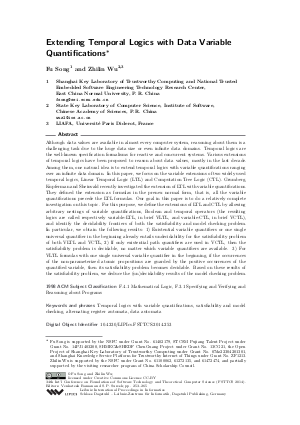Extending Temporal Logics with Data Variable Quantifications
Authors Fu Song, Zhilin Wu
-
Part of:
Volume:
34th International Conference on Foundation of Software Technology and Theoretical Computer Science (FSTTCS 2014)
Part of: Series: Leibniz International Proceedings in Informatics (LIPIcs)
Part of: Conference: IARCS Annual Conference on Foundations of Software Technology and Theoretical Computer Science (FSTTCS) - License:
 Creative Commons Attribution 3.0 Unported license
Creative Commons Attribution 3.0 Unported license
- Publication Date: 2014-12-12
File

PDF
LIPIcs.FSTTCS.2014.253.pdf
- Filesize: 0.56 MB
- 13 pages
Document Identifiers
Subject Classification
Keywords
- Temporal logics with variable quantifications
- satisfiability and model checking
- alternating register automata
- data automata
Metrics
- Access Statistics
-
Total Accesses (updated on a weekly basis)
0PDF Downloads0Metadata Views
Abstract
Although data values are available in almost every computer system, reasoning about them is a challenging task due to the huge data size or even infinite data domains. Temporal logics are the well-known specification formalisms for reactive and concurrent systems. Various extensions of temporal logics have been proposed to reason about data values, mostly in the last decade. Among them, one natural idea is to extend temporal logics with variable quantifications ranging over an infinite data domain. In this paper, we focus on the variable extensions of two widely used temporal logics, Linear Temporal Logic (LTL) and Computation Tree Logic (CTL). Grumberg, Kupferman and Sheinvald recently investigated the extension of LTL with variable quantifications. They defined the extension as formulas in the prenex normal form, that is, all the variable quantifications precede the LTL formulas. Our goal in this paper is to do a relatively complete investigation on this topic. For this purpose, we define the extensions of LTL and CTL by allowing arbitrary nestings of variable quantifications, Boolean and temporal operators (the resulting logics are called respectively variable-LTL, in brief VLTL, and variable-CTL, in brief VCTL), and identify the decidability frontiers of both the satisfiability and model checking problem. In particular, we obtain the following results: 1) Existential variable quantifiers or one single universal quantifier in the beginning already entails undecidability for the satisfiability problem of both VLTL and VCTL, 2) If only existential path quantifiers are used in VCTL, then the satisfiability problem is decidable, no matter which variable quantifiers are available. 3) For VLTL formulas with one single universal variable quantifier in the beginning, if the occurrences of the non-parameterized atomic propositions are guarded by the positive occurrences of the quantified variable, then its satisfiability problem becomes decidable. Based on these results of the satisfiability problem, we deduce the (un)decidability results of the model checking problem.
Cite As Get BibTex
Fu Song and Zhilin Wu. Extending Temporal Logics with Data Variable Quantifications. In 34th International Conference on Foundation of Software Technology and Theoretical Computer Science (FSTTCS 2014). Leibniz International Proceedings in Informatics (LIPIcs), Volume 29, pp. 253-265, Schloss Dagstuhl – Leibniz-Zentrum für Informatik (2014)
https://doi.org/10.4230/LIPIcs.FSTTCS.2014.253
BibTex
@InProceedings{song_et_al:LIPIcs.FSTTCS.2014.253,
author = {Song, Fu and Wu, Zhilin},
title = {{Extending Temporal Logics with Data Variable Quantifications}},
booktitle = {34th International Conference on Foundation of Software Technology and Theoretical Computer Science (FSTTCS 2014)},
pages = {253--265},
series = {Leibniz International Proceedings in Informatics (LIPIcs)},
ISBN = {978-3-939897-77-4},
ISSN = {1868-8969},
year = {2014},
volume = {29},
editor = {Raman, Venkatesh and Suresh, S. P.},
publisher = {Schloss Dagstuhl -- Leibniz-Zentrum f{\"u}r Informatik},
address = {Dagstuhl, Germany},
URL = {https://drops.dagstuhl.de/entities/document/10.4230/LIPIcs.FSTTCS.2014.253},
URN = {urn:nbn:de:0030-drops-48475},
doi = {10.4230/LIPIcs.FSTTCS.2014.253},
annote = {Keywords: Temporal logics with variable quantifications, satisfiability and model checking, alternating register automata, data automata}
}
Author Details
References
-
R. Alur, P. Cerny, and S. Weinstein. Algorithmic analysis of array-accessing programs. ACM Trans. Comput. Logic, 13(3):27:1-27:29, 2012.

-
M. Bojanczyk, C. David, A. Muscholl, T. Schwentick, and L. Segoufin. Two-variable logic on data words. ACM Trans. Comput. Log., 12(4), 2011.

-
E. Damaggio, A. Deutsch, R. Hull, and V. Vianu. Automatic verification of data-centric business processes. In BPM, 2011.

-
N. Decker, P. Habermehl, M. Leucker, and D. Thoma. Ordered navigation on multi-attributed data words. In CONCUR, 2014.

-
S. Demri, D. Figueira, and M. Praveen. Reasoning about data repetitions with counter systems. In LICS, 2013.

-
S. Demri and R. Lazić. LTL with the freeze quantifier and register automata. ACM Trans. Comput. Logic, 10(3):16:1-16:30, 2009.

-
E. A. Emerson and K. S. Namjoshi. On reasoning about rings. Int. J. Found. Comput. Sci., 14(4):527-550, 2003.

-
D. Figueira. Alternating register automata on finite words and trees. Logical Methods in Computer Science, 8(1), 2012.

-
D. Figueira. Decidability of downward XPath. ACM Trans. Comput. Log., 13(4):34, 2012.

-
O. Grumberg, O. Kupferman, and S. Sheinvald. Model checking systems and specifications with parameterized atomic propositions. In ATVA, 2012.

-
O. Grumberg, O. Kupferman, and S. Sheinvald. An automata-theoretic approach to reasoning about parameterized systems and specifications. In ATVA, 2013.

-
O. Grumberg, O. Kupferman, and S. Sheinvald. Personal communication, June 2014.

-
I. M. Hodkinson, F. Wolter, and M. Zakharyaschev. Decidable and undecidable fragments of first-order branching temporal logics. In LICS, 2002.

-
I. M. Hodkinson, F. Wolter, and M. Zakharyaschev. Decidable fragment of first-order temporal logics. Ann. Pure Appl. Logic, 106(1-3):85-134, 2000.

-
M. Kaminski and N. Francez. Finite-memory automata. Theor. Comput. Sci., 134(2):329-363, 1994.

-
A. Kara, T. Schwentick, and T. Zeume. Temporal logics on words with multiple data values. In FSTTCS, 2010.

-
O. Kupferman. Variations on safety. In TACAS, 2014.

-
O. Sheinvald, S. Grumberg and O. Kupferman. A game-theoretic approach to simulation of data-parameterized systems. In ATVA, 2014.

-
F. Song and T. Touili. LTL model-checking for malware detection. In TACAS, 2013.

-
F. Song and T. Touili. Pushdown model checking for malware detection. STTT, 16(2):147-173, 2014.

-
M. Y. Vardi. An automata-theoretic approach to linear temporal logic. In Conference on Logics for Concurrency : Structure Versus Automata, pages 238-266, 1996.

-
V. Vianu. Automatic verification of database-driven systems: a new frontier. In ICDT, 2009.

